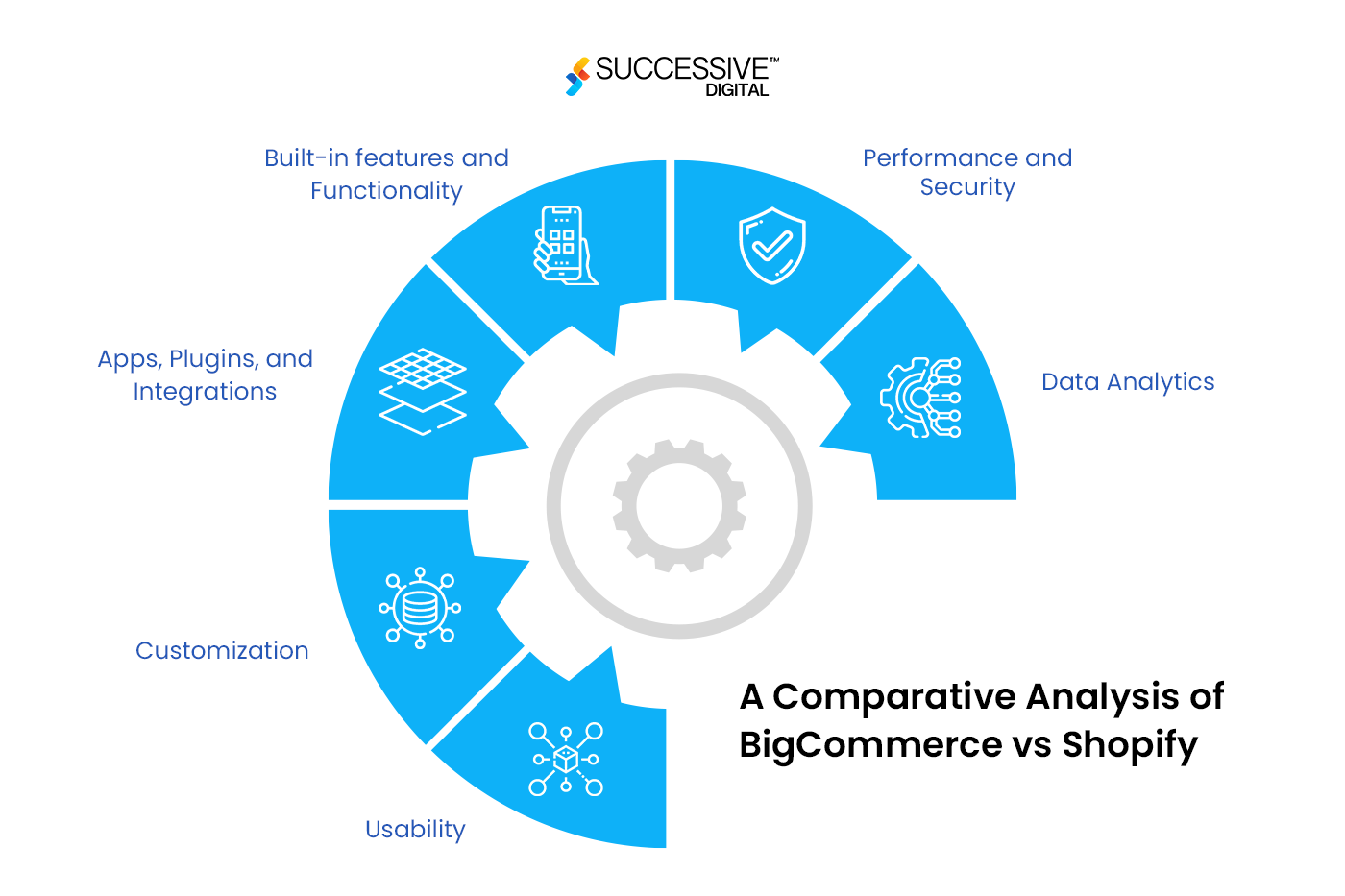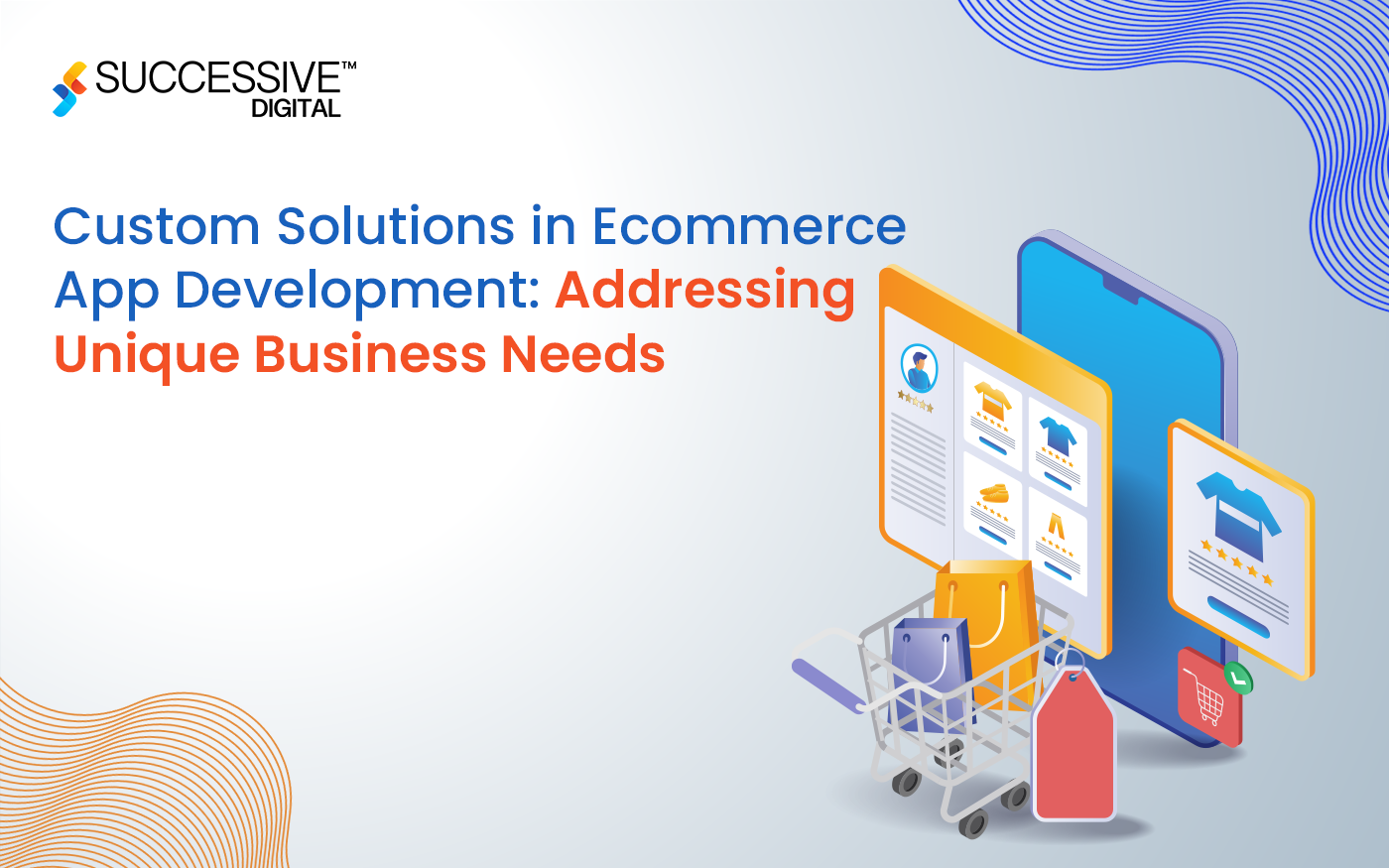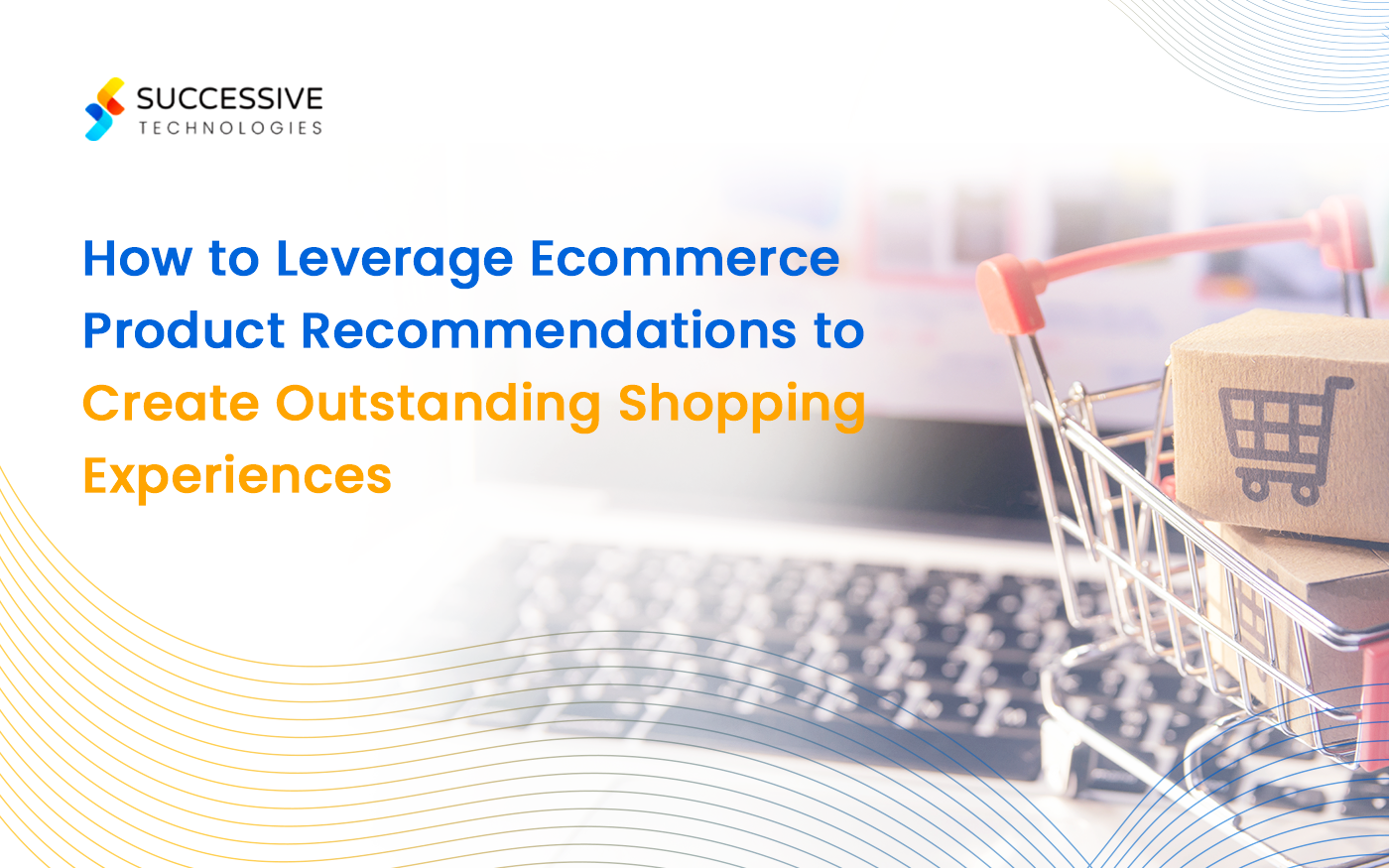eCommerce has witnessed massive growth in the last few years, thanks to customers’ increasing demand to shop online instead of visiting a brick-and-mortar store. This surge has also fueled the popularity of various eCommerce platforms such as Shopify and BigCommerce. Both are the key players in the industry, but choosing the best option among them can often be a dilemma.
At a broader level, Shopify and BigCommerce function similarly–their pricing is similar, and they both let you build an eCommerce store powered by their built-in features and app integrations. However, when we compare both platforms, at some point, Shopify is the winner, while in some cases BigCommerce is. So, which platform is best for your business? Both are software-as-a-service (SaaS) platforms offering specific capabilities; however, the right choice will depend on various differentiating factors which we will further discuss in this blog. Once you make the decision, you can consult an expert eCommerce development company that can handle the development process and build a custom solution.
Now before we get into the nitty-gritty of BigCommerce vs Shopify, let’s quickly discuss both platforms with a detailed overview.
An Overview of BigCommerce
BigCommerce is an open-source, software-as-a-service (SaaS)-based eCommerce platform that helps in building a fully customized eCommerce store which simplifies the process of setting up and managing end-to-end eCommerce operations. It handles the backend, hosting, and security of the website, giving businesses the flexibility to build a storefront that well aligns with their brand.
Moreover, it has everything you need to build and manage an online store. Whether you run a single business or have multiple businesses, it provides features including customization options, a shopping cart, a product catalog, order management options, and a centralized repository to manage all stores, in all languages, from a single source of truth.
The platform offers various built-in APIs, themes, templates, UI kits, and integrations with frontend frameworks and third-party software which enables a BigCommerce development company to customize your stores just as you want.
An Overview of Shopify
Similar to BigCommerce, Shopify is also a SaaS-based platform that allows businesses to build and design an online store. However, it offers a little more when it comes to functionalities. The platform allows businesses to sell in multiple places, including web, mobile, brick-and-mortar locations, pop-up shops, and across multiple channels such as social media to online marketplaces.
At its core, Shopify provides a comprehensive set of tools and built-in features designed to streamline the process of building, optimizing, launching, and scaling an online store. It comes with an array of templates and themes, and a dedicated app marketplace allowing businesses to create a unique store powered with custom features that align with their brand identity.
A Comparative Analysis of BigCommerce vs Shopify

The Bigcommerce Shopify comparison can be a complex process since both are leading platforms offering significant features. The factors discussed below will help you understand the mere differences between Shopify and BigCommerce. So, let’s discuss them.
-
Usability
BigCommerce has a user-friendly interface with a drag-and-drop feature for customizing the store layout. This feature allows you to seamlessly add new pages, products, or categories and edit them as required. It also offers APIs for integrations, as well as a built-in content management repository for easier management and product content delivery.
When it comes to BigCommerce vs Shopify, the latter is more user-friendly than the former. Its intuitive interface makes it easy to navigate the store, add products, and optimize all operations. The drag-and-drop feature is also available in this platform which enables businesses to easily set up the look and feel of the store.
Shopify and BigCommerce both provide flexibility to integrate multiple eCommerce services to enhance the store’s functionality. However, Shopify has more integration options. In terms of usability, it is hard to beat Shopify — but BigCommerce comes very close.
-
Customization
Shopify and BigCommerce both come with a theme store that offers hundreds of paid and free-of-cost customizable, mobile-responsive themes one can choose from. The drag-and-drop feature of BigCommerce is ideal for simple modifications, however, if you need to make specific changes it might lack flexibility and here you will require assistance from an expert BigCommerce development partner to handle changes in the code editor. BigCommerce also limits font changes, so if you have any specific fonts for your brand, you will need additional sources.
On the contrary, Shopify offers far more customization options than BigCommerce. The theme editor of the platform gives you more flexibility with a wider selection of modules to select, add, and remove as required. It also allows you to make more subtle design changes in fonts and colors as suited to your brand messaging.
-
Apps, Plugins, and Integrations
BigCommerce offers more than 1200 applications, plugins, and flexibility for third-party integrations to allow you to track shipments, analyze customer behavior, personalize their shopping experience, and streamline other eCommerce operations. However, Shopify offers more than 8000 apps and brings out-of-the-box functionality for your store.
While both BigCommerce and Shopify offer a lot of apps, plugins, and integrations to extend the functionality of your store, the choice between Shopify vs BigCommerce will depend upon the range of apps and integrations provided by these platforms and the one that suits your requirements best.
Moreover, you can also check out our blog on Tips to Scale your eCommerce business with Shopify and learn how this platform can assist in eCommerce website development and help boost your sales and ROI.
-
Built-in features and Functionality
Coming down to features, both, Shopify and BigCommerce offer a wide range of features, including shopping carts, inventory control, and a selection of themes to allow seamless setup of your store.
While BigCommerce provides functionality such as multi-storefront setup, wholesale and B2B commerce capabilities, international expansion, and omnichannel selling options, Shopify takes functionality a step further. It also offers features such as point-of-sale (POS) to support your brick-and-mortar stores.
Furthermore, with BigCommerce you get more than 65 payment gateway integrations and integration with popular digital and mobile wallets such as Apple Pay and Amazon Pay, however, Shopify offers payment gateway integrations as well as has its dedicated payment gateway, also known as ‘Shopify Payments’, which can save your payment integration costs. Hence, in terms of functionality, Shopify is the clear winner.
-
Performance and Security
When it comes to testing the performance and security of your eCommerce store, BigCommerce, and Shopify, being a cloud-based platform, prioritize security and have built-in features to safeguard your crucial data.
However, BigCommerce is one step ahead in the BigCommerce Shopify comparison.
BigCommerce has a robust infrastructure that can handle peak traffic and offers multiple layers of security to protect the site from unauthorized access. It offers free SSL certification that comes with its domain hosting and also allows you to purchase the certificate either from BigCommerce or from third-party vendors. On the other hand, Shopify also offers optimum performance capabilities but can be lacking at some point in cases of peak traffic scenarios. It provides free SSL certificates but does not let you install any other third-party certifications.
In verdict, both are ideal and offer secure platforms, but if you want more layers of security, BigCommerce would be the ideal solution.
You can also check out this blog Why Choose BigCommerce for eCommerce website development to understand the core features of this platform and how it can support your business.
-
Data Analytics
Both platforms leverage cloud capabilities, including advanced analytics and reporting features, to help eCommerce businesses analyze user behavior and market trends and optimize their operations.
BigCommerce and Shopify, both store data in a centralized cloud environment. However, accessibility is easier in BigCommerce since it’s based on a headless architecture that enables API-based commerce. The headless feature is available in Shopify as well, however, only with Shopify Plus.
Hence, the analytics tools of BigCommerce are more in-depth and robust as compared to Shopify. So, if you are a business that requires access to basic business data to understand overall performance and identify trends Shopify would be ideal. But if you want in-depth analysis then you must choose BigCommerce.
Shopify or BigCommerce: Which is the Right Platform for Your Business?
In a nutshell, Shopify and BigCommerce are both excellent eCommerce development platforms comprising various features and capabilities. They both offer a visually appealing design, customization options, reliable performance, and robust security.
However, when it comes down to BigCommerce vs Shopify, the decision will depend on your specific business needs, business size, and lastly, budget.
Though Shopify will be best suitable for small and medium-scale businesses and well-established enterprises that require highly complex online stores can opt for BigCommerce.
Note: If you choose Shopify, you can consult a professional partner offering Shopify development services. If you select BigCommerce, consult an expert BigCommerce partner who can handle the overall development process while integrating the custom features as per your requirements.
Conclusion
Choosing the right eCommerce platform is a critical decision for any business aiming to establish or expand its online presence. Among the leading contenders in the market are Shopify and BigCommerce, each offering a robust set of features tailored to diverse business needs. In the dilemma of BigCommerce vs Shopify, both platforms are ideal. However, the choice ultimately depends on your business’s specific requirements and growth trajectory. Hence, evaluate both platforms based on the factors discussed above and then make a decision.
You can also book a consultation with our eCommerce experts at Successive Digital, who will help you select the right option and handle the development and deployment process.
Frequently Asked Questions
With a decade of experience developing BigCommerce-based websites and applications, our expert developers at Successive Digital will work closely with you to understand your specific requirements and create a custom online store powered by BigCommerce.
Both platforms, Shopify and BigCommerce are well suited to build an eCommerce store. However, each offers a specific suite of features suitable for specific needs. Hence, the choice amongst them will depend on your particular requirements.
The major difference between Shopify and BigCommerce is that Shopify serves as a payment gateway, a shipping and fulfillment provider, and an email marketing service while still being an eCommerce platform. In contrast, BigCommerce offers only one core product: its eCommerce platform.












